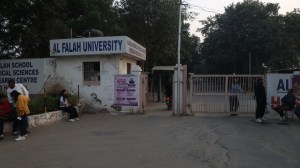Batting for the future
Sports does strange things to grown men and women. We saw it for a month during the soccer World Cup when even the seemingly inscrutable Kor...

Sports does strange things to grown men and women. We saw it for a month during the soccer World Cup when even the seemingly inscrutable Koreans and Japanese chose to wear their emotions on their sleeve. Sporting nationalism unites people and creates a form of hero worship that enables individuals to share in the joy and sorrow of their idols. In ancient times, the Greeks believed that the Olympics took them closer to the gods. In the modern era, sporting achievement enables millions of people to cast off day-to-day boredoms and reach for the transcendental. Sports as a modern religion is a well-worn theme, but whereas organised religion is often doctrinaire and divisive, sports is far less rigid and far more inclusive.
So, when India triumphed in cricket over the weekend, it was perfectly acceptable to let the adrenalin just flow. As it is, with every boundary hit, my friend, as convivial of spirit as only a Punjabi can be, ensured that the Bacardi and Coke kept coming. As the midnight hour approached, and the impossible turned into reality, the soul flew into the ether. The spirit triumphed over daily toils and became larger than life itself. My friends sang. My wife danced. And I, hopelessly unable to register the significance of what had just transpired, buried myself in the couch and wept.
Just the day before I had been in Ahmedabad to witness the annual Jagannath rath yatra. With the men in khaki outnumbering those in saffron, the post-Godhra riots in the state had meant that the yatra was more a test for the law and order machinery in Gujarat than a religious celebration. The state administration partially redeemed itself, showing the political will in managing the situation that had been missing only five months ago.
|
I came back from Ahmedabad wondering where India was heading. But on that Saturday night, I wept because pessimism crumbled and hope began |
But to describe a peaceful yatra as a sign that normalcy has returned would be to gloss over ground realities. As the rath passed through the Muslim-dominated areas of the city, the sense of siege was apparent. Shops closed and doors shut, the local Muslim community leaders had declared a voluntary 8216;janata8217; curfew. Some even fled back to the sanctuary of relief camps. For months, they had been victimised and virtually hounded out of mixed neighbourhoods. In their eyes, there was fatigue and despair, a belief that they still had no place in the civil society of tomorrow.
But now young Mohammad Kaif holds aloft our embattled tricolour. As Muslims huddle in fear in Ahmedabad watching the rath yatra rumble past, Mohammad Kaif leads the victory charge at Lords. With steel in his heart and elegance in his wrists Kaif rose to the expectations of every Indian and played the innings of his young life, showing just why he is a cricketer for the future. By his side stood Zaheer Khan, another of Indian cricket8217;s young guns, blessed with raw courage and tremendous talent. I came back from Ahmedabad wondering where India was heading. But on that Saturday night, I wept because pessimism crumbled and hope began.
Both Kaif and Zaheer come from towns outside the traditional power centers of Indian cricket. Kaif played much of his early cricket in Allahabad, while Zaheer climbed up the cricket ladder from the distant outpost of Ahmednagar. None of them had the benefit of being members of the big clubs of Mumbai or Delhi or of being promoted by any benefactor. They have nothing but skill. The arrival of Kaif and Zaheer reflects a new identity for Indian cricket: less metropolitan, more egalitarian and far more 8216;national8217; in the true sense of the term.
After a long time, the team has at least two top-class Muslim players in the eleven Mumbai8217;s Wasim Jaffer could well be a third. The last great Indian Muslim cricketer was Mohammed Azharuddin. Azhar was for years the ultimate symbol of India8217;s all-inclusive sports nationalism: a devout Hyderabadi Muslim who prayed five times a day, he played for the country with pride and passion. The match-fixing controversy has scarred the Azhar legacy, but his contribution to the sport in difficult times should not be underestimated. In 1992-93, a few weeks after the Mumbai riots, as captain Azhar scored a sparkling century against the English in Kolkata, an innings that was a fitting riposte to those who were seeking to define patriotism in narrow religious terms. The symbolic importance of a success story like Azharuddin can8217;t be wished away.
Now, Kaif and Zaheer have the potential to play a similar role in post-Gujarat India. In an 8216;us8217; and 8216;them8217; social and political landscape where once again members of the minority community are sought to be stereotyped as inherently 8216;anti-national8217;, Kaif and Zaheer are powerful symbols who expose the fraud of such ridiculous propaganda. For a generation growing up in the increasingly ghettoised neighbourhoods of the country 8212; be it Ahmedabad or Aligarh 8212; they offer some hope for a better future, for a non-discriminatory society that rewards merit, irrespective of religious affiliation. While Abdul Kalam as Rashtrapati has already helped break the stereotype, as a nuclear technologist he remains a somewhat remote success story, distant from the daily lives of millions of Indians. But cricketers are folk heroes people can easily identify with. Like the Black West Indian cricketers of the C.L.R. James era, India8217;s Muslim cricketers too have a role to play beyond the boundary.
It8217;s a role that should also be appreciated by the large crowds of immigrant Indians who, right through the English cricket season, have defied the Tebbit test while making Lords look like an extension of Karol Bagh. The long-distance nationalism of the NRI has manifested itself in support for organisations like the Vishwa Hindu Parishad who seek to provide a cultural identity through easily marketable, but socially divisive religious symbols. With its global reach and unifying character, cricket provides a positive alternative identity to the religious consciousness of the VHP which is based on reviving ancient animosities. Who would Generation Next rather idolise: Mohammad Kaif or Ashok Singhal?
The writer is managing editor, New Delhi Television. Write to him at editpage2000hotmail.com
- 01
- 02
- 03
- 04
- 05






























